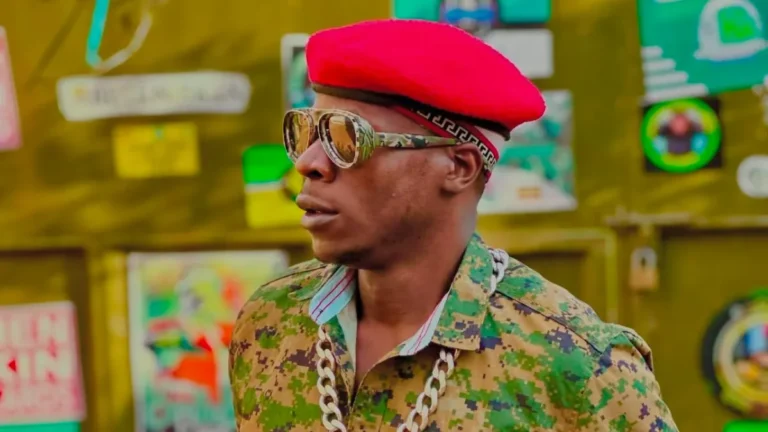Ugandan singer Alien Skin — real name Patrick Mulwana — has sparked a heated national debate after accusing the government of failing to recognize or support the country’s music industry.
In a candid sit-down with Stickman Musudan, the Fangone Forest hitmaker didn’t hold back, claiming that the entertainment sector has been systematically ignored, leaving artists to fend for themselves while other industries, like sports, receive consistent recognition and government backing.
“This country has no national awards,” Alien Skin lamented. “There are no rewarding systems to motivate artists who excel above the others. Music is not really considered a big deal by the government; artists are not counted. We are actually being sabotaged instead.”
“Artists Don’t Matter That Much”
According to Alien Skin, Uganda’s creative community continues to be overlooked despite its enormous contribution to the nation’s culture and economy.
He questioned why the government has never established national music awards to honor and inspire musicians who excel in their craft, arguing that such neglect has discouraged many artists from striving for excellence.
“The government doesn’t really recognize the music industry,” he said. “It’s like artists don’t matter that much. We’re just expected to entertain people and move on.”
The outspoken singer, known for his unapologetic street image and massive youth following, said he finds it ironic that the same government often turns to artists during political campaigns — yet refuses to meaningfully invest in their development.

Pulling Out of Political Rallies
Alien Skin revealed that his growing frustration with government neglect is the reason he has stopped performing at political rallies, a move that has already sparked conversation across social media.
“That’s why when I’ve been called to those campaigns, I ask why they don’t take those football players or boxers who are recognized and paid well by the government,” he said.
The Sitya Danger singer added that until the state begins to treat the entertainment industry as an essential pillar of national identity — the same way it celebrates athletes — he sees no reason to lend his art or image to political functions.
The Sports vs. Music Debate
Alien Skin’s remarks have reignited a long-running debate among Ugandan creatives about unequal government support.
While athletes often receive national honors, financial incentives, and media recognition for their achievements, musicians — who play a key role in tourism, culture, and social commentary — often operate without any structured government support or reward systems.
Many in the music community argue that Uganda’s music industry generates jobs, shapes identity, and exports culture — yet it remains largely self-funded, with little infrastructure or grants to help artists thrive.
“We see footballers getting houses and bonuses, while musicians who lift Uganda’s flag globally struggle to even access healthcare or performance spaces,” one artist commented online.
Social Media Reacts
Alien Skin’s comments quickly went viral across X (formerly Twitter), TikTok, and Facebook, with fans and fellow musicians weighing in on both sides of the issue.
Some praised the Party singer for “speaking truth to power,” while others accused him of turning political after benefiting from the same system he now criticizes.
“Alien Skin is right — artists deserve recognition just like athletes,” one fan wrote.
“It’s about time someone said it. The creative industry has been sidelined for too long,” another user added.
Others were more skeptical:
“He should start his own awards if he really wants change instead of blaming government,” a critic said.
A Voice for the Streets
Alien Skin has built his brand as a voice of the ghetto — raw, fearless, and unfiltered. His Fangone Forest movement represents youth from underprivileged backgrounds who use music as a tool for expression and empowerment.
He’s known for defying industry norms and speaking his mind, even when it stirs controversy. His comments on government neglect reflect broader frustrations shared by many creatives who feel that artistic talent in Uganda is undervalued and unsupported.
The Bigger Picture: A Forgotten Industry
The Ugandan entertainment scene remains one of the most vibrant in East Africa, producing stars who dominate regional charts and streaming platforms. Yet, many say it still lacks structural support — from copyright enforcement to fair royalties, music grants, and international representation.
Industry experts argue that government collaboration could help professionalize the sector, create employment, and boost Uganda’s global cultural influence.
“Music is a billion-shilling industry,” said one insider. “But without proper support, it remains an informal hustle instead of a national asset.”
What’s Next for Alien Skin?
Despite his criticism, Alien Skin remains focused on his art and his fans. He continues to perform, record, and mentor young artists from marginalized communities through the Fangone Forest label.
Insiders say he plans to launch more independent projects — free from political influence — and keep pushing conversations that could redefine how Uganda values its entertainers.
“Whether they recognize us or not, we’ll keep creating,” he said confidently. “Music is power. It’s our voice.”
A Call for Recognition
As Uganda continues to celebrate its athletes on global stages, Alien Skin’s bold statement has forced the nation to look inward: Why isn’t the same pride extended to musicians who amplify Uganda’s culture across borders?
Whether you agree with him or not, one thing’s clear — Alien Skin has once again stirred the conversation that many were afraid to start.
What do you think — is Alien Skin right about the government neglecting Uganda’s music industry?
Drop your thoughts below and stay tuned to E Page One for more updates on Uganda’s entertainment scene.





